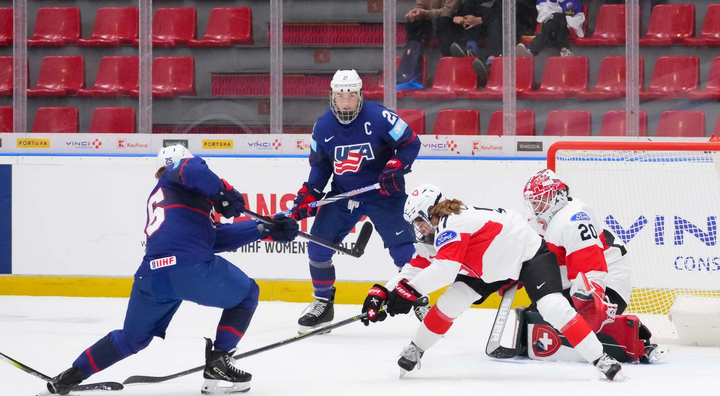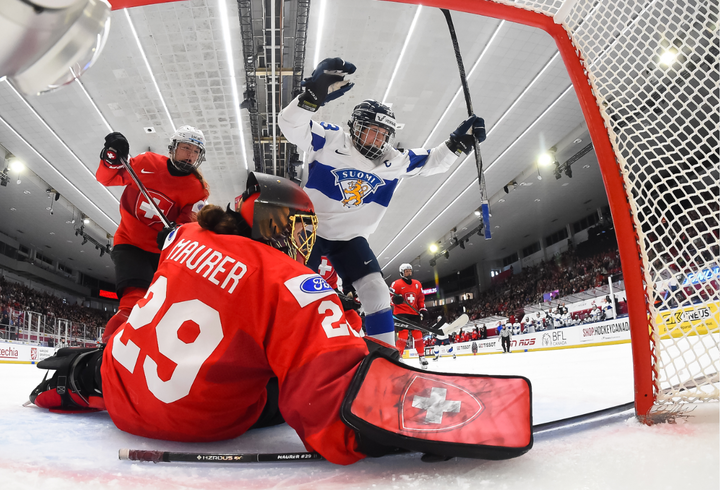NCAA Year in Review: Maine and Holy Cross
We look back at the year that was for Maine and Holy Cross
As the NCAA women’s hockey season winds down, writers William Whyte and Gabriella Fundaro are taking an in-depth look at how each team has shaped up in 2018-19. In the first of this series, we break down the year for the two squads eliminated from Hockey East playoff contention.
Holy Cross
William: How do you think about Holy Cross’s season overall? The last two programs to go D1 — Merrimack and RIT — were built from the goal out: Merrimack with Samantha Ridgewell and later Lea-Kristine Demers, and RIT with the amazing Ali Binnington. Both of those teams had more losses than wins but they were never an easy out. I feel like Holy Cross’s goaltending isn’t quite at that level.
Gabriella: RIT was a particularly strong program in its first season — the Tigers posted a .500 record and followed it up with a couple of 20-win seasons immediately after — and I think you’re correct in saying that Holy Cross has not had the goaltending to match this year. Both Jada Brenon, a freshman, and Julia Pelletier, a sophomore, posted save percentages under the .900 mark. To be sure, they had a thin defense in front of them and were facing teams with Olympians, national team members, and well-established performers in Hockey East. But without an edge in net, it makes it hard for a newcomer like Holy Cross to stay in contention as any game goes on.
William: I think it’s interesting that before moving to Hockey East, Holy Cross had been playing at a higher level than Merrimack or RIT — Holy Cross was D1 with a D2/3 schedule, while RIT was D3 only and Merrimack literally didn’t exist — and yet their first season has been a lot rougher (1-27-3 compared to 5-26-3 for Merrimack and 15-15-3 for RIT). Do you think they underestimated the difference in the level of play, even though they’d played some D1 opponents the previous year?
Gabriella: I wouldn’t say they underestimated what they’d be facing this season; I think it was just a tougher transition in certain ways. RIT, for instance, had won a championship in its last D3 season and brought that experience up to the D1 level. It also wasn’t a completely clean slate for the Crusaders, like it was for Merrimack, which can affect culture and internal expectations. And finally, I think it’s fair to say the quality of women’s hockey overall gets better every year, making it harder for a newcomer to compete with the field.
Holy Cross with the historic stunner!!!! @HCrossWHockey upends No. 5 Northeastern, 5-3, to earn its first @hockey_east win in program history as well as its first upset of a top-5 team! #NCAAWHockey pic.twitter.com/UEcetxLiTN
— NCAA Ice Hockey (@NCAAIceHockey) December 1, 2018
Stick taps: Defeating Northeastern 5-3 at the end of November, after being down 2-0 at the end of the first. You could see in the post-game video what the win meant to those kids.
Losing an edge: Falling 8-0 to Maine, especially considering the Black Bears are also out of Hockey East playoff contention. The Crusaders have a bit of a ways to go to close the gap with the rest of the Hockey East field.
Maine
Gabriella: It came down to the bitter, bitter end for Maine and unfortunately for the Black Bears, they weren’t able to get it done in the final game of the season against Vermont. Beyond that, though, they were winless in their last eight games and never scored more than twice during that stretch. It’s not the ending to the year that I would have pegged. Back in September, I thought Maine might finish as high as third in Hockey East. But the Black Bears seemed to see a good amount of regression in terms of individual production—most notably, Teresa Vanišová was a 46-point scorer last year and tallied 24 this year, Michelle Weis scored 21 points last year and 11 this year. Did you expect to see Maine as a whole take a step back this year, or is their second-last-place Hockey East finish a surprise to you?
William: A big surprise! Last year Maine seemed like a program that was unexpectedly on the upswing and was successfully running the playbook that Shannon Miller pioneered at UMD -- go overseas for talent other schools weren’t recruiting, and work hard on culture so the team coheres. It culminated in Maine being ranked for a lot of last season and in that amazing Hockey East 2018 quarterfinal decider game where they came from 3-0 down with fifteen minutes left to beat BU in overtime. Although Brooke Stacey graduated, Maine looked set to continue that momentum. Do you have any insight into why they didn’t?
Gabriella: What really surprises me about the Black Bears’ finish this season is they didn’t really take a big hit in terms of total team production or goals against. 2.06 goals against per game this season is an improvement over 2.18 goals against in 2017-18, and their offense (2.41 goals per game) was about on par with last season’s numbers (2.39 goals per game). Yet they went from a 19-14-5 team to a 14-15-5 team, and were completely outpaced in Hockey East play. Maine had just seven conference wins this season, after notching 11 last season en route to a third-place conference finish. Do you think Hockey East as a whole is just that much more competitive now?
William: As a Hockey East homer I have to take issue with that “now”. Last season, the lowest Hockey East team in the Pairwise was Merrimack at 24th, the highest placement by far for any lowest-in-its-conference team, so Hockey East has been quietly strong for a while. If anything, Hockey East has taken a step back this year, with Vermont, Connecticut and Maine all looking weaker. All of which is to say that it looks like the problems are in Orono, not on the schedule, and that given this year’s disappointment, next year looks likely to be harder, not easier.
Stick taps: The Black Bears had some success early in the season, with two wins over Boston University (one in November, the next in January) and a tie against Northeastern sticking out. I’d say that 3-3 tie with the Huskies showed the most potential for the team, though.
Losing an edge: This past weekend’s game against Vermont was probably the biggest disappointment for Maine this year, just because of how much was riding on it. If the Black Bears had found a way to get a win in that game, they’d still be playing this weekend in the Hockey East tournament.





Comments ()